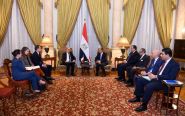
Since Lebanon’s independence, Syria has consistently viewed the country as an unjustly severed appendage of Pan-Arabism. From the very beginning of the so-called Lebanese civil wars, the Assad regime aimed to establish political, military and economic dominance over its smaller neighbor.
“One people, two countries,” proclaimed Hafez al-Assad. Syria's role in Lebanon's disintegration is significant. The 100-day battle in 1978, during which the Syrian army surrounded and incessantly bombarded the Ashrafieh neighborhoods, the brutal siege of Zahleh in 1981… These events, among many others, are deeply ingrained in collective memory. In 1982, amid the Israeli invasion of Lebanon, both armies (Israeli and Syrian), after a sham aerial combat display, divided their tasks. The Israelis expelled Arafat from Beirut, and following weeks of bombardment, the Syrians drove him from Tripoli to Tunis. For the Palestine Liberation Organization (PLO), the path to Jerusalem no longer went through Jounieh.
The Syrian army, a political and economic parasite, never complied with the Taif Agreement, which stipulated its withdrawal from Lebanon. It should be noted that its task was greatly facilitated. The “liberation war,” launched recklessly and senselessly, allowed Syrian troops to invade what remained of Lebanon and establish a lasting presence in Baabda and Yarzeh (the Ministry of Defense). However, the assassination of Rafic Hariri in 2005 made it impossible for the Syrian army to maintain its presence in Lebanon.
Since then, the Assad regime has not relinquished its role in Lebanon. It cannot afford to; facing international sanctions and, notably, since 2019, the Caesar Act imposed by the United States, it has resorted to smuggling operations from Lebanon. The Syrian regime has significantly benefited from Lebanese state subsidies on essential goods and raw materials, siphoning off billions of dollars and thereby playing a major role in Lebanon's economic and financial collapse.
In fact, its sole priority is to survive at any cost. Therefore, even the slightest action in support of the Palestinians is not on the agenda – not in the least.
In 2011, the "Arab Spring" began. In Syria, the protests for democracy turned into repression and, eventually, a civil war. During the conflict, the Yarmouk Palestinian camp, home to 160,000 refugees, was conveniently destroyed and emptied of its residents. This has been a recurring theme. Yes, Syria has waged war, but against the Lebanese, Palestinians, Iraqis, and its own people. The military might of Damascus has never posed a significant threat to the Israelis.
At one point, President Assad ruled over little more than his palace. Yet, thanks to Russia, the Iranian Revolutionary Guards and Hezbollah, he was able to reclaim the "useful Syria," all at the expense of hundreds of thousands of lives and a level of destruction that decades will never erase.
Since October 7, Damascus has adopted a low-key stance, with an operation dubbed "open doors and skies." The Israeli army is acting with complete freedom, striking Aleppo, Homs, central Damascus, airports and roads, without the slightest attempt at retaliation or even resistance. But where are the anti-aircraft missiles, the weapons, those thousands of tanks and cannons, the planes of an army that once terrified the Lebanese? Probably gathering dust in a hangar somewhere.
Some factions in Damascus might even feel somewhat liberated from the stifling Iranian-Hezbollah support. Among the countless issues affecting Lebanon, the unrestrained presence of around 2.5 million Syrians serves as a political asset that would surely please Hafez al-Assad, especially on the day – fast approaching – when it becomes increasingly hard to tell "the two countries" apart. Meanwhile, Israel seems quite at ease with Syria 2.0.
The Syrian Golan has become nothing more than a distant memory, transformed into a battleground by various factions. At some point, Vladimir Putin may choose to intervene, possibly offering concessions in the region in exchange for halting the flow of Western arms to Ukraine. In such a scenario, we must be wary of allowing Lebanon to become a bargaining chip for one side or the other. After all, as the saying goes, “Might makes right...”




Comments